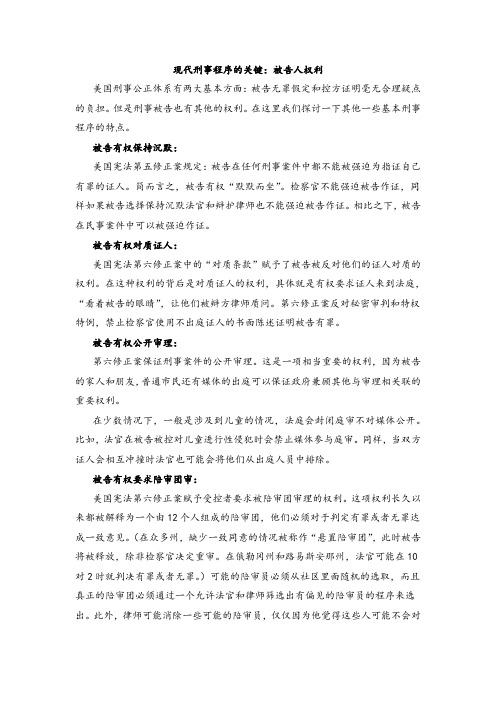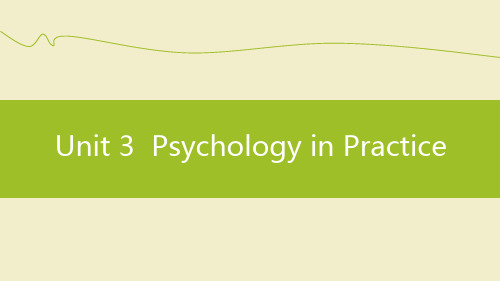ESAP法律英语教程-电子教案Unit4
高中英语 Unit4 law and order-reading精品教案 牛津译林版选修10

Unit 4 Law and orderReading The fight against cybercrimeStep 1: Lead-inNowadays in our daily life, we often hear that someone’s QQ number has been stolen.Have you ever found that you can’t log on your QQ suddenly?Do you know what has happened to it?What can it be used to do by someone who has stolen it?(The person who has stolen it can know the information of your friends and then try to rob them acting as you This is a kind of cybercrime.)Today we are going to read a passage concerning cybercrime. Before we read the passage, please surf the Internet to find as much information about cybercrime as possible, such as categories of it, the extent and also the solution to it.Step 2: Fast reading for general ideasGo through the passage as quickly as possible and try to find answers to the three questions in part A on Page 50. Pay attentionto the most important information.Answers:1. There are four types of cybercrime.2. 503 panies and government departments were surveyed.3. The only solution is international cooperation.Step 3: Detailed reading for important informationRead the passage a second time and plete Parts C1 and C2.Answers:C1 1.Cybercrime is a relatively new term that refers to any puter-related criminal offence.Step 4:Practice:1.plete Part D. You may refer to the reading passage on pages 50 and 51 for somehelp.2. plete Part E.E (1) cybercrime (2) tight (3) puters (4) security (5) viruses(6) hacked (7) content (8) violence (9) offence (10) privateStep 5: Post-reading activities1. First role-play the dialogue in Part F and then forms groups of four to discuss the three questions that follow.2. You will be divided into groups of four. Each group chooses to report one aspectfromthe following items: the definition and different types of cybercrime; the extent of theproblem; the legal situation regarding cybercrime and the solution to the problem. Step 5: Language points:Step6:Homework1. Read the text again and again. Try to memorize the language points.2. Parts A1 and A2 on page122 in Workbook.。
ESAP法律英语教程-电子教案Unit4

Vocabulary bank
Understanding abbreviations and acronyms
An abbreviation is a shorter version of something. For example, PC /pi:si:/
is an abbreviation for personal computer.
Unit 4 Computers in law
Skills focus Reading • identifying topic development within a paragraph • using the Internet effectively • Evaluating Internet search results
4.1 Vocabulary 4.2 Reading
4.3 Extending 4.4 Extending
skills
skills
4.1 Vocabulary A Study the word phrases in box a.
1 Which words or phrases relate to computers and the Internet? Which relate to books and libraries? Find two groups of words. 2 Find pairs of words and phrases with similar meanings, one from each group. 3 Check your ideas with the first part of the Computer Jargon Buster on the opposite page.
法律英语教程第4单元text b翻译

现代刑事程序的关键:被告人权利美国刑事公正体系有两大基本方面:被告无罪假定和控方证明毫无合理疑点的负担。
但是刑事被告也有其他的权利。
在这里我们探讨一下其他一些基本刑事程序的特点。
被告有权保持沉默:美国宪法第五修正案规定:被告在任何刑事案件中都不能被强迫为指证自己有罪的证人。
简而言之,被告有权“默默而坐”。
检察官不能强迫被告作证,同样如果被告选择保持沉默法官和辩护律师也不能强迫被告作证。
相比之下,被告在民事案件中可以被强迫作证。
被告有权对质证人:美国宪法第六修正案中的“对质条款”赋予了被告被反对他们的证人对质的权利。
在这种权利的背后是对质证人的权利,具体就是有权要求证人来到法庭,“看着被告的眼睛”,让他们被辩方律师质问。
第六修正案反对秘密审判和特权特例,禁止检察官使用不出庭证人的书面陈述证明被告有罪。
被告有权公开审理:第六修正案保证刑事案件的公开审理。
这是一项相当重要的权利,因为被告的家人和朋友,普通市民还有媒体的出庭可以保证政府兼顾其他与审理相关联的重要权利。
在少数情况下,一般是涉及到儿童的情况,法庭会封闭庭审不对媒体公开。
比如,法官在被告被控对儿童进行性侵犯时会禁止媒体参与庭审。
同样,当双方证人会相互冲撞时法官也可能会将他们从出庭人员中排除。
被告有权要求陪审团审:美国宪法第六修正案赋予受控者要求被陪审团审理的权利。
这项权利长久以来都被解释为一个由12个人组成的陪审团,他们必须对于判定有罪或者无罪达成一致意见。
(在众多州,缺少一致同意的情况被称作“悬置陪审团”,此时被告将被释放,除非检察官决定重审。
在俄勒冈州和路易斯安那州,法官可能在10对2时就判决有罪或者无罪。
)可能的陪审员必须从社区里面随机的选取,而且真正的陪审团必须通过一个允许法官和律师筛选出有偏见的陪审员的程序来选出。
此外,律师可能消除一些可能的陪审员,仅仅因为他觉得这些人可能不会对他这一方表示同情但这些人的决定(被称作“不述理由而要求陪审员回避”)可能不是基于他们的个人特点,例如种族、性别、宗教信仰和国家起源。
高教版ESAP心理学英语教程-电子教案Unit03

a sample page of a personality test; this is known as a psychometric
test
3.1 Vocabulary
B Study the pictures on the opposite page. 1 What research activities are shown? Discuss the pictures using phrases from box a. (You will not need all the phrases.)
~cy
‘policy
Vocabulary bank
Exceptions:
Stress within words
Multi-syllable words ending in the following letters are normally stressed two syllables from the end.
3.1 Vocabulary C Look at the words in box a.
1 Underline the stressed syllable in each word. 2 Which word has the same stress pattern as appraisal? 3 Sort the other words into groups according to their stress patterns. 1 appraisal, attitude, consistent, culture
an organization chart showing an institutional
ESAP法律英语教程-电子教案Unit 3 Crimes and civil wrongs

3.1 Vocabulary
B Study the photos on the opposite
page. Decide the type of wrong being committed in each picture. Use words from box a.
3.1 Vocabulary
B Study the photos on the opposite page. Decide
3.2 Listening A Study the slides from a lecture.
1 What do you expect to learn in this lecture? Make a list of points. 2 Write down some key words you expect to hear. 3 Check the pronunciation of the key words, with other students or with a dictionary. 4 How are you going to prepare for this lecture?
Unit 3 Crimes and civil wrongs
Skills focus Listening •preparing for a lecture •predicting lecture content •making lecture notes •using different information sources
~al
cus'todial, in'tentional
Vocabulary bank
Stress within words
Exceptions
高教版ESAP心理学英语教程-电子教案Unit01

1.1 Vocabulary
B Read these sentences from psychology texts. Complete each sentence with one of the bold words from Exercise A. Change the form if necessary.
1 Freud’s experiments in psychoa_n_a_l_y_s_is___ gave rise to his ‘dream theory’. 2 In Pavlov’s experiments with dogs, the conditioned __s_ti_m_u_l_u_s__ was a light. 3 Hallucinations, or _v_i_s_io_n_s__, are a common symptom of mental disorder. 4 Overstimulation of the organism can lead to emotional tension or _s_t_re_s_s__. 5 Kelly was an early proponent of Personal _C__o_n_st_r_u_ct__Theory. 6 Skinner’s experiments in operant __c_o_n_d_i_ti_o_n_in_g___ were based on behaviourism. 7 Attributing your feelings to another person is known as _p_r_o_j_ec_t_io_n___. 8 The _c_o_n_sc_i_o_u_s__ mind is the most accessible level of mental activity.
ESAP信息通讯技术英语教程-电子教案Unit3
auto’matic, bio’ metric
~ion
appli’ cation, con ‘version
~ent
com’ ponent, e’ fficient
~tial
diffe’rential
3.1 Vocabulary D Complete each sentence with a phrase from box
teller machine. 3 The microchip in a biometric passport contains information about an individual,
such as their fingerprints or a face scan.
4 Online
shopping is a convenient way to buy things, but many people worry
online shoppingotocol (WAP)
automated teller
machine (ATM)
alarm system
3.1 Vocabulary
B Study the pictures on the opposite page. 1What aspects of life do they show? Talk about each picture using words from box a. (You will not need all the s.)2 How does each item work?
Vocabulary bank
Stress within words
Exceptions
Multi-syllable words ending in the following letters are normally stressed two syllables from the end.
高教版ESAP法律英语教程-电子教案Unit7
a result of something
Vocabulary bank Recognizing fixed phrases from legal English (1)
There are also a large number of fixed phrases which are commonly
In other words, … the same information put in a different way
Looking at it another way, …
Vocabulary bank Recognizing fixed phrases from legal English (1)
There are also a large number of fixed phrases which are commonly
used in academic English in general. Examples:
Phrases
What comes next?
The point is … in order to (do X, Y)
used in academic English in general. Examples:
Phrases
What comes next?
In addition to (X, Y) As well as (X, Y) In the case of … At the same time, … … based on …
7.2 Listening
7.4 Extending skills
7.1 Vocabulary A Study the words in box a.
1 Match nouns in column 1 with nouns in column 2 to make compound nouns. 2 Which word in each phrase has the strongest stress?
实用英语电子教案3(第四版)Unit 4 unit 4教学素材
The Royal Society of London for the Improvement of Natural Knowledge, known simply as the Royal Society, is a learned society for science, and is arguably the oldest such society in existence.[1] Formally founded on 15 July 1662 by Royal Charter as the "Royal Society of London", the Society was initially an extension of the "Invisible College", with the founders intending for it to be a place of research and discussion. The Society today acts as a scientific advisor to Her Majesty's Government, receiving a grant-in-aid from them, funding a variety of research fellowships and scientific start-up companies and acting as the United Kingdom's Academy of Sciences.The Society is governed by its Council, which is chaired by Society's President, according to a set of Statutes and Standing Orders. The members of Council and the President are elected from and by its Fellows, the basic members of the Society, who are themselves elected by existing Fellows. There are currently 1,314 Fellows, allowed to use the postnominal title FRS (Fellow of the Royal Society), with 44 new Fellows appointed each year. There are also Royal Fellows, Honorary Fellows and Foreign Fellows, the last of which are allowed to use their postnomial title ForMemRS (Foreign Member of the Royal Society). The current President is Lord Rees of Ludlow. Since 1967, the Society has been based at 6–9 Carlton House Terrace, a Grade I listed building in central London that underwent a substantial renovation between 1999 and November 2003.The Nobel Prize (Swedish: Nobelpriset) is an annual, international award originating in Sweden. The award was established in 1895 by the Swedish chemist and inventor of dynamite Alfred Bernhard Nobel.[1][2] It was first awarded in 1901 for achievements in Physics, Chemistry, Physiology or Medicine, Literature, and Peace. An associated prize, the Nobel Memorial Prize in Economic Sciences, was instituted by Sweden's central bank in 1968 and first awarded in 1969.[3] Although the Nobel Prize in Economics is not technically a Nobel Prize, its winners are announced with the Nobel Prize recipients and it is presented at the Nobel Prize Award Ceremony. The Nobel Prizes in the specific disciplines (physics, chemistry, physiology or medicine, and literature) and the Prize in Economics are widely regarded as the most prestigious award one can receive in those fields.[3]A recipient of the Nobel Prize (called a laureate) earns a gold medal, a diploma bearing a citation and a sum of money.[4][5] The amount of money awarded depends on the income of the Nobel Foundation that year. In 2009, the amount was 10 million SEK (US$1.4 million) per prize.[6] If a prize is awarded to more than one laureate, the money is either split evenly among them or, for three laureates, it may be divided into a half and two quarters.[7]The prizes are awarded by different associations. The Nobel Prize in Physics, Nobel Prize in Chemistry, and Nobel Memorial Prize in Economic Sciences are awarded by the Royal Swedish Academy of Sciences; the Nobel Prize in Physiology or Medicine is awarded by the Nobel Assembly at (the) Karolinska Institutet; and the Nobel Prizein Literature is granted by the Swedish Academy.[8][9] The Nobel Peace Prize is not awarded by a Swedish organisation, but rather by the Norwegian Nobel Committee.[8][9]The Nobel Prize has been criticised for not always choosing the best candidates, the lack of a Nobel Peace prize for Mahatma Gandhi being a prime example.[10] Also controversial is the strict rule against a prize being awarded to more than three people at once. This inevitably means one or more people will not be recognised if a notable achievement is accomplished by a team of collaborators.[11] Similarly, the prohibition of posthumous awards fails to recognise achievements by a collaborator who happens to die before the prize is awarded/wiki/Nobel_PrizeScience Magazine was a half-hour television show produced by the Canadian Broadcasting Corporation (CBC) from 1975 to 1979.The show was hosted by geneticist David Suzuki, who previously hosted the daytime youth programme Suzuki On Science. Science Magazine moved beyond the youth audience and was mostly broadcast during prime time, except for occasional sessions where the show was repeated at afternoon times.The program featured news and features on scientific research and developments. Regular items within the show included "How Things Work" and "Science Update". Jan Tennant and Cy Strange of the CBC were the program's film feature narrators.Science Magazine, as such, ended production when the CBC joined it with The Nature of Things, keeping the latter as title and Suzuki as host./wiki/Science_MagazineHarvard University (incorporated as The President and Fellows of Harvard College) is a private university located in Cambridge, Massachusetts and a member of the Ivy League. Established in 1636 by the colonial Massachusetts legislature,[2] Harvard is the oldest institution of higher learning in the United States and currently comprises ten separate academic units.[5] It is also the first and oldest corporation in the United States.[6]Initially called "New College" or "the college at New Towne", the institution was renamed Harvard College on March 13, 1639. It was named after John Harvard, a young clergyman from the London Borough of Southwark and alumnus of the University of Cambridge (after which Cambridge, Massachusetts is named), who bequeathed the College his library of four hundred books and £779 (which was half ofhis estate), assuring its continued operation.[7] The earliest known official reference to Harvard as a "university" occurs in the new Massachusetts Constitution of 1780.During his 40-year tenure as Harvard president (1869–1909), Charles William Eliot radically transformed Harvard into the pattern of the modern research university. Eliot's reforms included elective courses, small classes, and entrance examinations. The Harvard model influenced American education nationally, at both college and secondary levels.Harvard has the second-largest financial endowment of any non-profit organization (behind the Bill & Melinda Gates Foundation), standing at $26 billion as of September 2009[citation needed]. Harvard is consistently ranked at the top and as a leading academic institution in the world by numerous media and academic rankings.。
ESAP商学英语教程-电子教案Unit1
1.1 Vocabulary E Use words from this lesson to discuss the following pictures.
(international) transport
perform ance
tang
ible
transform (a)tion
verb ➔ noun
can be verb ➔ noun
Another word ability, liability terrify, purify, identify
active sailor replaceable jobless natural, commercial management category, industry
sports goods
1.1 Vocabulary E Use words from this lesson to discuss the following pictures.
consumers, durable goods
raw materials (for making chocolate)
1.1 Vocabulary
A Read the sentences. The bold words are probably familiar to you in general English. But can you think of a different meaning for each word in business English? Change the form if necessary.
demand making products for sale
special offer, e.g., buy one (pair of shoes) and get another (pair) free
- 1、下载文档前请自行甄别文档内容的完整性,平台不提供额外的编辑、内容补充、找答案等附加服务。
- 2、"仅部分预览"的文档,不可在线预览部分如存在完整性等问题,可反馈申请退款(可完整预览的文档不适用该条件!)。
- 3、如文档侵犯您的权益,请联系客服反馈,我们会尽快为您处理(人工客服工作时间:9:00-18:30)。
university databasoef learning resources. Click on Law Resources
on the main
. menu
4.1 Vocabulary C Study the abbreviations and acronyms in box b.
1 How do you say each one?
open close
log in/log on exit/log off
4.1 Vocabulary
B Complete the instructions for using the Learning Research Centre with words or phrases from box a.
4.1 Vocabulary
B Complete the instructions for using the Learning
Research Centre with words or phrases from box a.
If you want to access web pages on the world wide web , you must
first log in to the university Intranet with your username and
password. You can use any search engine but the default is Google.
Browse/Searchfor web pages by typing one or more keywords in the
Unit 4 Computers in law
Skills focus Reading • identifying topic development within a paragraph • using the Internet effectively • Evaluating Internet search results
electronic resources
index cross-conference catalogue
search engine results hyperlink database
library table of contents look up page
World Wide Web menu browse/search web page
4.1 Vocabulary
A Study the word phrases in box a.
Common word or phrase Word or phrase for Internet for books and libraries and electronic information
books
Vocabulary bank
Understanding abbreviations and acronyms
An abbreviation is a shorter version of something. For example, PC /pi:si:/
is an abbreviation for personal uter.
search box and clicking on Search, or pressing Enter.When the results
appear, click on a hyperlink (highlighted in blue) to go to the web
page. Click on Back to return to the results listing.You can also use the
2 Divide them into two groups: • Abbreviations • Acronyms
See Skills bank.
Acronyms: CAL /kæl/, PIN /pɪn/, ROM /rɒm/, WAN /wæn/.
Abbreviations: DVD, HTML, HTTP, ISP, LCD, MNC,URL (not pronounced /ɜ:/), USB, WWW.
Writing •reporting research findings
Vocabulary focus • computer jargon • abbreviations and acronyms • discourse and stance markers • verb and noun suffixes
4.1 Vocabulary 4.2 Reading
4.3 Extending 4.4 Extending
skills
skills
4.1 Vocabulary A Study the word phrases in box a.
1 Which words or phrases relate to computers and the Internet? Which relate to books and libraries? Find two groups of words. 2 Find pairs of words and phrases with similar meanings, one from each group. 3 Check your ideas with the first part of the Computer Jargon Buster on the opposite page.
An acronym is similar to an abbreviation, but it is pronounced as a word. For example, ASBO / zbEU/ is an acronym for Anti-Social Behavior Order.
We normally write an abbreviation or acronym with capital letters, although the full words have lower case letters.
